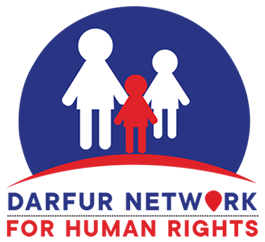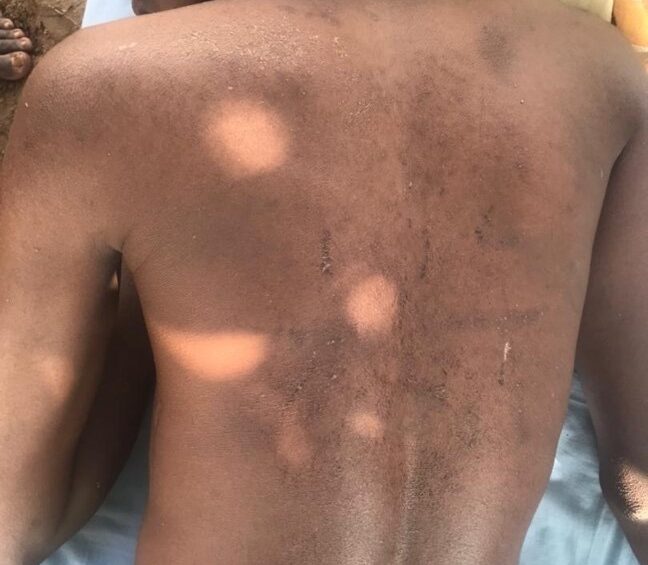Note: This comprehensive report results from a confidential interview conducted in a secure environment, skilfully facilitated by a human rights professional. Due to the sensitive nature of the subject matter, the survivor has provided informed and explicit assent for both the interview and the subsequent compilation of this report. To safeguard the survivor’s identity and the well-being of all involved parties, pseudonyms have been employed. The survivor is aware that this report will be disseminated online and may be utilized for advocacy purposes. The interview was initially conducted in Arabic and subsequently transcribed into English with the assistance of a qualified translator.
Introduction:
On May 17, 2023, 6 to 7 members of the paramilitary group Rapid Support Force (RSF) forcefully entered the house of Ibet Khetem South Darfur capital Nyala. They accused him of working for the Sudanese Armed Forces (SAF). He had documented the 2019 Sudanese revolution, which led to the ousting of President Omar Al Bashir after 30 years in power. During that time, RSF offered him to collaborate, but he declined, believing that military outfits do not contribute positively to the community.
They entered the house of Ibet Khatem, hurling slurs and accusing him of working for SAF. They started beating him, tied his hands, and threw him into the back of their car. There, he found a woman named Munaya, approximately 40 years old, and her two daughters, aged around 20 and 14. The incident was witnessed by the son of his cousin Aldum.
The Experience of Torture:
RSF transferred him to the Arab Open University in Khartoum, where he spent the next 58 days in detention, facing torture and inhumane treatment. It was one of the detention centres where he was placed with 300 other detainees in a single hall. The conditions were deplorable, with super congestion, only one window, and no toilets – necessitating the use of plastics. There was no place to sleep, and everyone’s hands were tied constantly. When RSF intended to torture someone, they would take them to a 3 by 3 interrogation room, and the sounds of torture echoed through the hall. The hall was divided separately for army personnel, civilians, diplomats, and politicians to be detained.
They offered me to work with them, but I kept saying NO, as no army outfit ever does any good for civilians.
The first instance of torture occurred on the same day he was arrested. RSF soldiers took him to the interrogation room and applied a hot iron to his spine, chest, legs, and neck while asking questions about his connections with the army, police, or anyone from the National Congress Party (NCP). He was also subjected to beatings with sticks, whips, and buttstocks, accompanied by slurs such as “you are a slave,” “illegitimate child,” and “you have to follow us as a slave.” They even melted plastics and dropped droplets on his body. There was a severe lack of food in detention, with RSF soldiers providing remnants of what they had eaten – sometimes once a day or once in two days. He also witnessed the rape and death of both men and women by the RSF during his time in detention.

(Marks of hot iron and beatings)
He endured this suffering for 58 days, sometimes facing torture two or three times a day. RSF soldiers would only stop torturing him when he lost consciousness, leaving him in the detention room. After some time, they would return to check if he was still alive. He witnessed the tragic deaths of 37 fellow detainees due to the inflicted torture. There was a designated room for execution where RSF threatened to end his life unless he agreed to work for them. Occasionally, RSF would conduct torture in front of other detainees, but most often, they took victims to the detention room. Each instance of torture was accompanied by demands to collaborate, sparing those who agreed from further beatings.
The RSF soldiers primarily spoke Arabic and French, and the survivor claims to have seen Russian mercenaries entering and leaving the detention campus in their tundra cars. RSF also collected data on all detainees. As a result of the beatings, he lost five teeth. After escaping captivity, a medical examination revealed that his back tissue was broken.

(Marks of hot iron and beatings)
One day, while disposing of plastic bags filled with urine, he noticed Red Cross workers on the campus. He learned that the Red Cross had a list of names consisting of 50 innocent civilians detained by RSF without any justification, demanding their release. He believes his name was on the list, but RSF concealed all detainees, asserting that only 50 people were detained for alleged involvement in looting, and they would soon be released. He vividly recalls an RSF soldier brandishing his gun at a Red Cross worker. Moreover, he was compelled to perform manual labour, such as carrying boxes of guns from one location to another within the facility. His location within the facility changed 9 to 10 times.
The Perpetrators:
Recalling the names and appearances of the perpetrators, he remembers that the head of the detention centre was a man called Major Isha Bushara. Other names he recalls include Al Fadul, Aburmabuta, Abu Shabia, and Abu Tawila. Additionally, one of the most powerful commanders of RSF, Mohamed Hamdan Dogolo, also visited the facility a few times. However, most of the torture was carried out by junior soldiers.
The Escape:
“Don’t come home; they came looking for you and took away my wife”
On July 14, 2023, while disposing of urine and other garbage, SAF bombings began in and around the facility, causing chaos. Seizing this moment, he and six other detainees escaped. As they ran, RSF soldiers fired bullets towards them. Tragically, one detainee was hit and died, another was injured, and RSF soldiers recaptured a third.
They sought refuge in the Al Greef neighbourhood, where RSF control was weak amidst constant shelling between RSF and SAF and bombings by SAF. Taking shelter in an empty guard’s quarter for a day, they headed towards his grandfather’s home in the Azhary neighbourhood, south of Khartoum, once the clashes subsided. Two survivors chose to go their own way from Al Greef.
En route to his grandfather’s house, he found a phone and called his uncle, who advised him not to come home, as RSF had already been looking for him and had taken away his wife. Subsequently, they found a milk van willing to transport them from Khartoum to Al Hasaisa—an area controlled by SAF at the time, now under RSF control. SAF, suspecting him of working for RSF, detained them again in a room, with a soldier keeping a close eye on them. As soon they found a chance, both of them escaped.
From there, they headed towards Al Kamileen. From Al Kamileen, he called a friend who sent him money, enabling him to travel towards Wad Madani. There, he underwent a medical check-up, revealing broken tissues in his back. He also acquired a phone and retrieved his old SIM card number. Subsequently, he received a call from his friend Hassania, but it was RSF soldiers on the other end, threatening him with death and urging him not to run away.
From Madani, they journeyed to Kosti and then to Rabak. The other individual who escaped with him stayed in Rabak due to a lack of funds to continue the journey and a need for urgent medical attention. Moving on from Rabak, he traveled to Joda and from there rode a donkey to Renk (South Sudan) on November 29, 2023. At the border, the South Sudan army questioned him about his injuries, and he lied, claiming to have had an accident as he could not trust anyone.
From South Sudan, he arrived in Uganda on December 13, 2023, where he lives in a hostel, seeking medical treatment.
Conclusion:
I cannot sleep at night; anywhere I go, I feel unsafe; RSF is following me everywhere. I have lost my life.
His immediate priority is to restore a feeling of security. He advocates for accountability concerning the RSF’s actions and envisions a peaceful resolution in the region. This would pave the way for a return to his everyday life.

